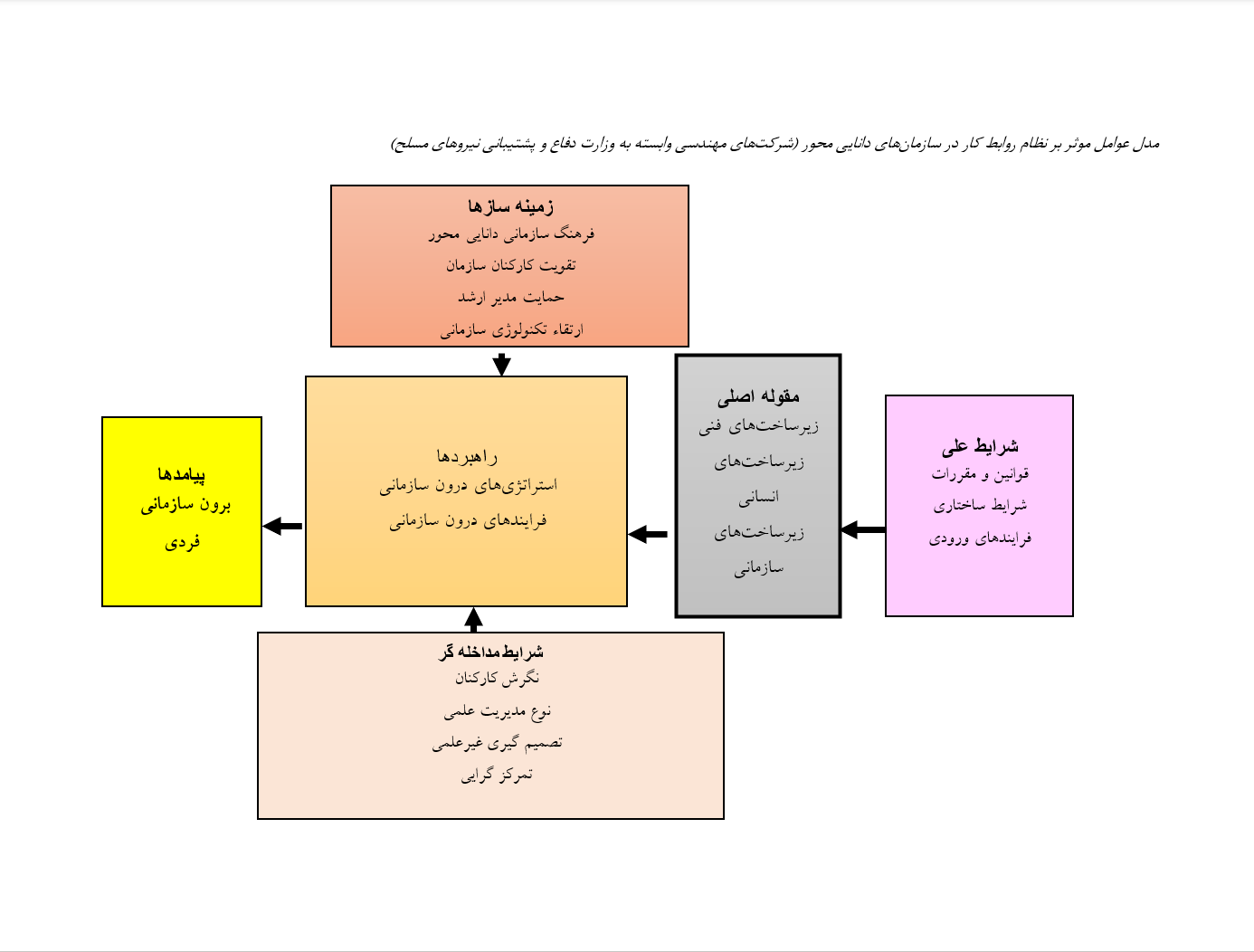Factors Influencing the Labor Relations System in Knowledge-Based Organizations (Engineering Companies Affiliated with the Ministry of Defense and Armed Forces Support)
Keywords:
Labor Relations System, Knowledge-Based Organizations, Engineering Companies, Ministry of Defense and Armed Forces SupportAbstract
The primary objective of this article is to identify and analyze the factors influencing the labor relations system in knowledge-based organizations (engineering companies affiliated with the Ministry of Defense and Armed Forces Support). The research is grounded in a data-driven approach and was conducted using grounded theory methodology. The research population consisted of experts in management, specializing in public administration, human resources, and organizational relations (those who had published books or articles), as well as managers and deputies of engineering companies affiliated with the Ministry of Defense and Armed Forces Support. Based on the criterion of theoretical saturation, 15 individuals were selected through purposive sampling. Data were collected via semi-structured interviews using Maxqda12 software. As a result, 131 initial concepts (open codes) and 19 main concepts (axial codes) were identified, which were categorized into a paradigmatic model comprising six selective codes, including causal factors (3 components and 37 indicators), contextual factors (5 components and 29 indicators), strategic factors (2 components and 11 indicators), intervening factors (4 components and 11 indicators), the main phenomenon (3 components and 22 indicators), and outcomes (2 components and 20 indicators).
Downloads
References
Abbas, J., Zhang, Q., Hussain, I., Akram, S., Afaq, A., & Shad, M. A. (2020). Sustainable innovation in small medium
enterprises: the impact of knowledge management on organizational innovation through a mediation analysis by
using SEM approach. Sustainability, 12(6), 2407. https://doi.org/10.3390/su12062407
Askari Poor Golvik, H., Bordbar, G., Marooti Sharif Abadi, A., & Sabk Roo, M. (2020). Designing a Dynamic Model of
Labor/Industrial Relations with Emphasis on Decent Work. Public Management Research, 13(49), 217-241.
https://jmr.usb.ac.ir/article_5994.html
Asman Nasab, B., & Ghodami, M. (2021). Knowledge Management in the Path of the Future. Strategic Management
Studies Quarterly, 12(46), 221-235. https://www.sid.ir/paper/409878/fa
Haass, O., Akhavan, P., Miao, Y., Soltani, M., Jan, T., & Azizi, N. (2023). Organizational citizenship behaviour on
organizational performance: A knowledge-based organization. Knowledge Management & E-Learning, 15(1), 85.
https://doi.org/10.34105/j.kmel.2023.15.005
Hajizadeh, P., & Sardari, A. (2021). The Effect of Knowledge Management on Improving Innovative Performance with
Emphasis on the Mediating Role of Organizational Learning (Case Study: Qaid Basir Petrochemical Holding).
Strategic Knowledge Management Journal, 1(2), 63-93. https://jkm.ihu.ac.ir/article_203696.html
Jambadu, L., Pilo, F., & Monstadt, J. (2024). Co-producing maintenance and repair: hybrid labor relations in water supply
in Accra, Ghana. Urban Research & Practice, 17(2), 280-302. https://doi.org/10.1080/17535069.2023.2180325
Kafashian, M., Asman Dareh, Y., & Mohammadian, Z. (2017). Measuring the Impact of Factors Affecting Knowledge
Management Behavior Formation from the Perspective of Students (Case Study: Ferdowsi University of Mashhad).
Library and Information Research Journal, 7(1), 153-173. https://infosci.um.ac.ir/article_32058.html
Kamali, M. (2018). Forecasting Cinema Box Office Sales with a Systemic Approach Yazd University, Faculty of
Economics, Management, and Accounting]. https://civilica.com/doc/1324019/
Mirspasi, N. (2021). Strategic Human Resource Management and Labor Relations with a Globalization Perspective. Mir
Publishing. https://www.amazon.de/-/en/Ashish-Malik/dp/9811303983
Mirzaei Mehr, G., & Fazl Zadeh, A. (2018). Examining the Impact of Knowledge Management on the Performance of
Audit Firms with the Mediating Role of Organizational Learning. Accounting and Management Perspectives, 1(5),
-14. https://civilica.com/doc/861799/
Naieb Asl, S. R. (2020). The Impact of Knowledge Management Dimensions on Project Success and Business Strategies.
Accounting and Management Perspectives, 3(25), 46-53. https://www.jamv.ir/article_108307.html
Nazari Zadeh, Z. M., Abili, K., Aryan, M., & Mohammadi, S. (2015). Examining the Possibility of Transforming the
Department of Education of the Ministry of Health, Treatment, and Medical Education into a Knowledge-Based
Organization: A Reflection on the Views of Employees. Journal of Electronic Learning, 6(1), 15-24.
https://civilica.com/doc/464081/
Norouzi Ali, A. (2021). Examining the Role of Organizational Learning and Knowledge Management on Organizational
Agility (Case Study: Social Security Organization of Shahroud). Accounting and Management Perspectives, 4(42),
-21. https://www.jamv.ir/article_131250.html
Safari, R., Sourani Yancheshmeh, R., Alizadeh, S., & Zamani Moghaddam, A. (2020). Identifying Components for
Enhancing the Motivation to Share Knowledge Among Faculty Members of Azad University in Tehran. Islamic
lifestyle with a focus on health, 4(2), 112.
https://www.islamiilife.com/?_action=article&kw=27791&_kw=%D8%AF%D8%A7%D9%86%D8%B4%DA%A
F%D8%A7%D9%87+%D8%A2%D8%B2%D8%A7%D8%AF+%D8%A7%D8%B3%D9%84%D8%A7%D9%85
%DB%8C
Salamon, E. (2024). Managing and resisting workplace reorganization: Labor-management relations in a pre-digital
media corporation. Journalism, 25(2), 334-352. https://doi.org/10.1177/14648849221138727
Salehi Kharizsangi, I., & Rashidi, M. M. (2023). Knowledge Management and Its Impact on Crisis Reduction with a
Human Resource Agility Approach. Crisis Management Studies, 15(3), 131-150.
https://www.sid.ir/fileserver/jf/4020713951005.pdf
Shahabi Nasab, A., Bahrami, M., Pirzad, A., & Hojatoost, S. (2021). The Impact of Quantum Management Skills on
Innovative Work Behavior with the Mediating Role of Psychological Empowerment and Knowledge Management:
A Case Study. Accounting and Management Perspectives, 4(38), 88-99.
https://www.ensani.ir/fa/article/453565/
Soma, R., Budiartha, I. N. P., & Kosasih, J. I. (2024). Construction of the execution arrangements of labor relations court
decisions on termination of employment relations in the tourism accommodation field based on legal protection.
Journal equity of law and governance, 4(1), 95-107.
https://www.ejournal.warmadewa.ac.id/index.php/elg/article/view/9455
Zar'aat Kar, S., Rajabi Farjad, H., & Naqash Zadeh, S. (2020). Identifying Human Resource Management Challenges in
the Public Sector and Its Impact on Productivity. Human Resource Management Research, 12(4), 197-224.

Downloads
Published
Submitted
Revised
Accepted
Issue
Section
License
Copyright (c) 2024 Journal of Technology in Entrepreneurship and Strategic Management (JTESM)

This work is licensed under a Creative Commons Attribution-NonCommercial 4.0 International License.










